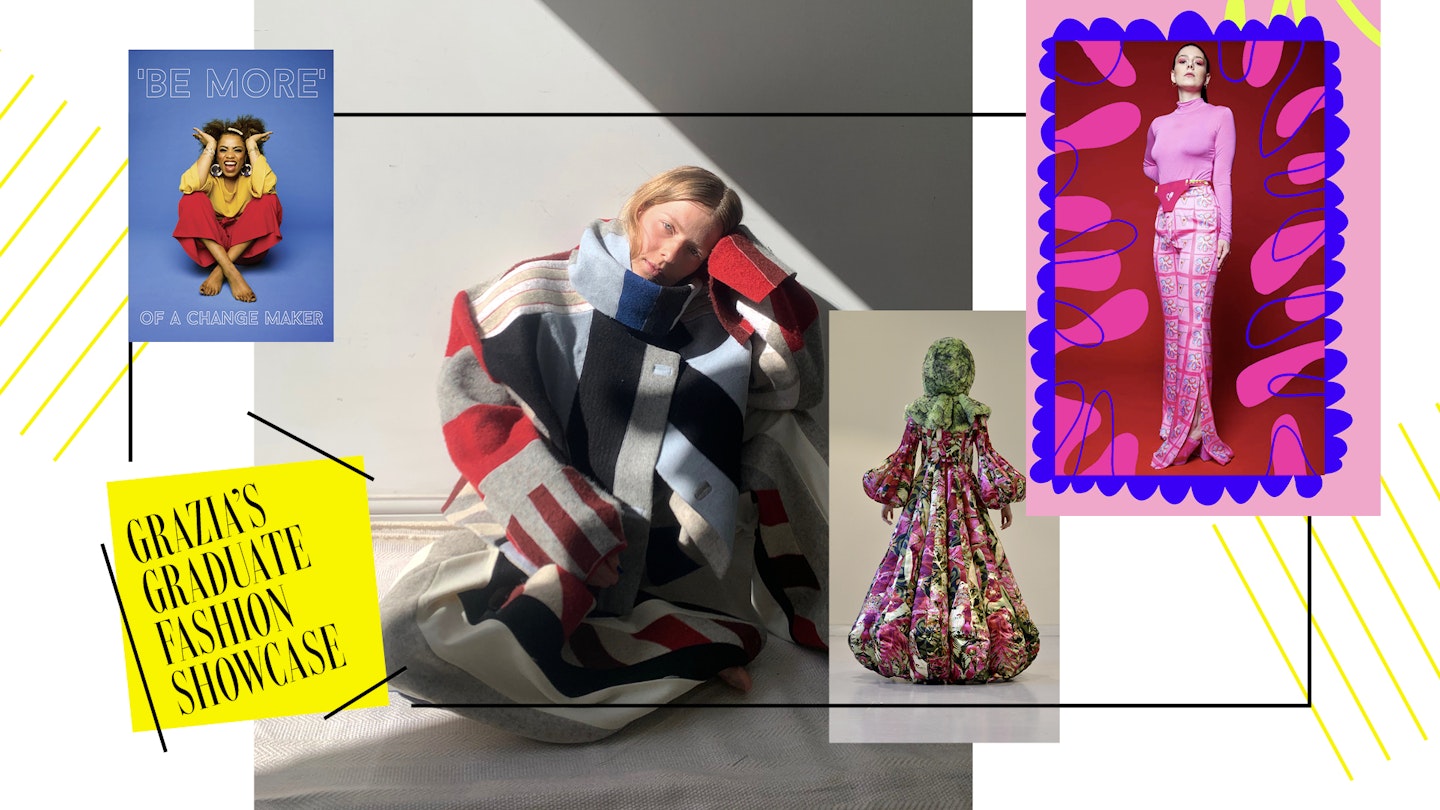Graduate Fashion Week (GFW) has become the event which thousands of students work towards every year. From schools and universities across the country, each has the opportunity not just to show their work to the wider fashion industry but to also be considered for a number of prizes awarded by GFW every year. This has seen young designers receive professional work placements, some graduates have receives money with which to launch their careers and some have enjoyed visibility in the media that has ultimately allowed them to flourish.
Of course, this year's GFW has been cancelled due to Covid-19, leaving the class of 2020 with dashed hopes and overwhelming disappointment. To try and assuage those feelings, Grazia is championing the wealth of young talent to be found across the UK with our very own Graduate Fashion Showcase.
We've chosen nine of our favourite fashion graduates who have studied everywhere from Leeds and Edinburgh to Norwich and Rochester.
Graduate Fashion Week: UK Fashion Students 2020
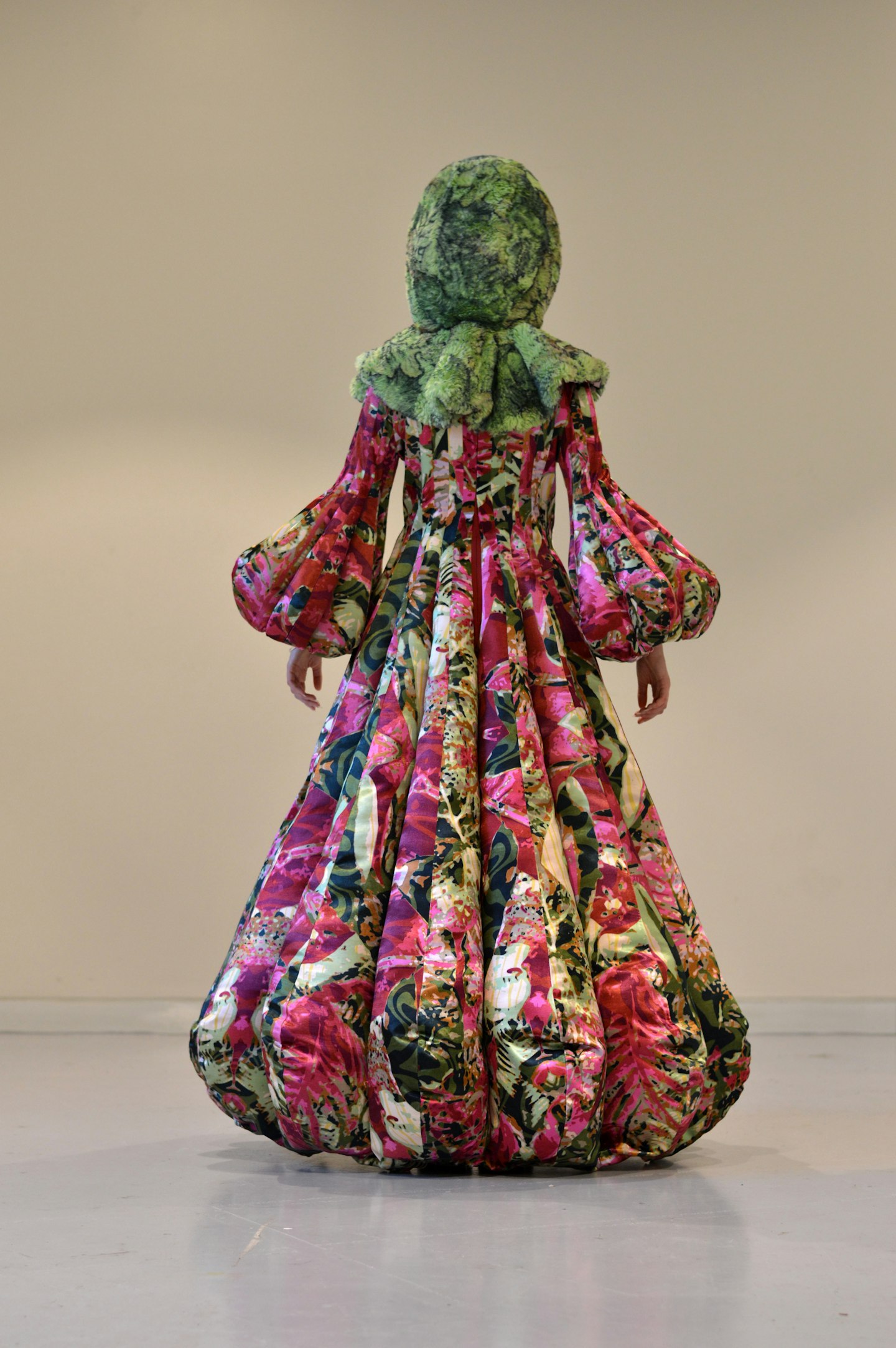 1 of 9
1 of 9Joshua Rhys Scott, BA Fashion Textiles: Print at UCA Rochester
**Can you please explain your final collection?**Botanical Caricatures is a big mashup of references with the central theme being luxury approached with an exaggerated and camp design sensibility. Volume is experimented with extensively with 80's sports and ski wear, and royal court wear both being key points of inspiration. Manipulating the body and restricting movement with excessive volume that could display a wide array of prints was the main aim of the collection.**What has been your biggest inspiration?**The biggest inspiration has come from Kew Gardens, specifically the Palm House and the Princess of Wales conservatory. I've had a fascination with plants ever since I was young and the glasshouses at Kew allow me to almost disappear into these fantastical spaces filled with the most weird and wonderful forms and colours imaginable.**Which fashion designers/creatives would you cite as your biggest inspiration?**The designer I've turned to for inspiration from the very start was Pierpaolo Piccioli. The direction in which he has taken Valentino is incredible and his approach to couture is truly something at which to marvel. Every single runway embodies this idea of excessive luxury while maintaining this feeling of highly edited taste and I'm absolutely obsessed with it.**What do you think fashion will look like in 10 years?**I genuinely don't know and I think that's what I like most about fashion, the fact that it is always changing and we'll never reach a place where fashion has finished evolving. I will say I hope consumption of fashion slows down and we're able to return to a place where we value higher priced but higher quality pieces being available to us as opposed to the environment we currently live in where we consume a large amount of low quality and ultimately disposable apparel.**What's been your highlight during your time studying?**For me it has been getting to work in an environment where I am surround by other incredibly talented creatives where support and critique is always available to help me better my work and myself. Being around a group of people working so freely truly is an incredible experience and I'll be forever grateful that I got to experience university with such a vibrant group of people where we all pushed each other to the absolute best we can be.**What's your ambition now you've graduated?**I really just hope to continue working creatively and keep myself growing as a designer. I've already started planning ready-to-wear based off my collection and I hope to be able to produce that as sustainably as possible.
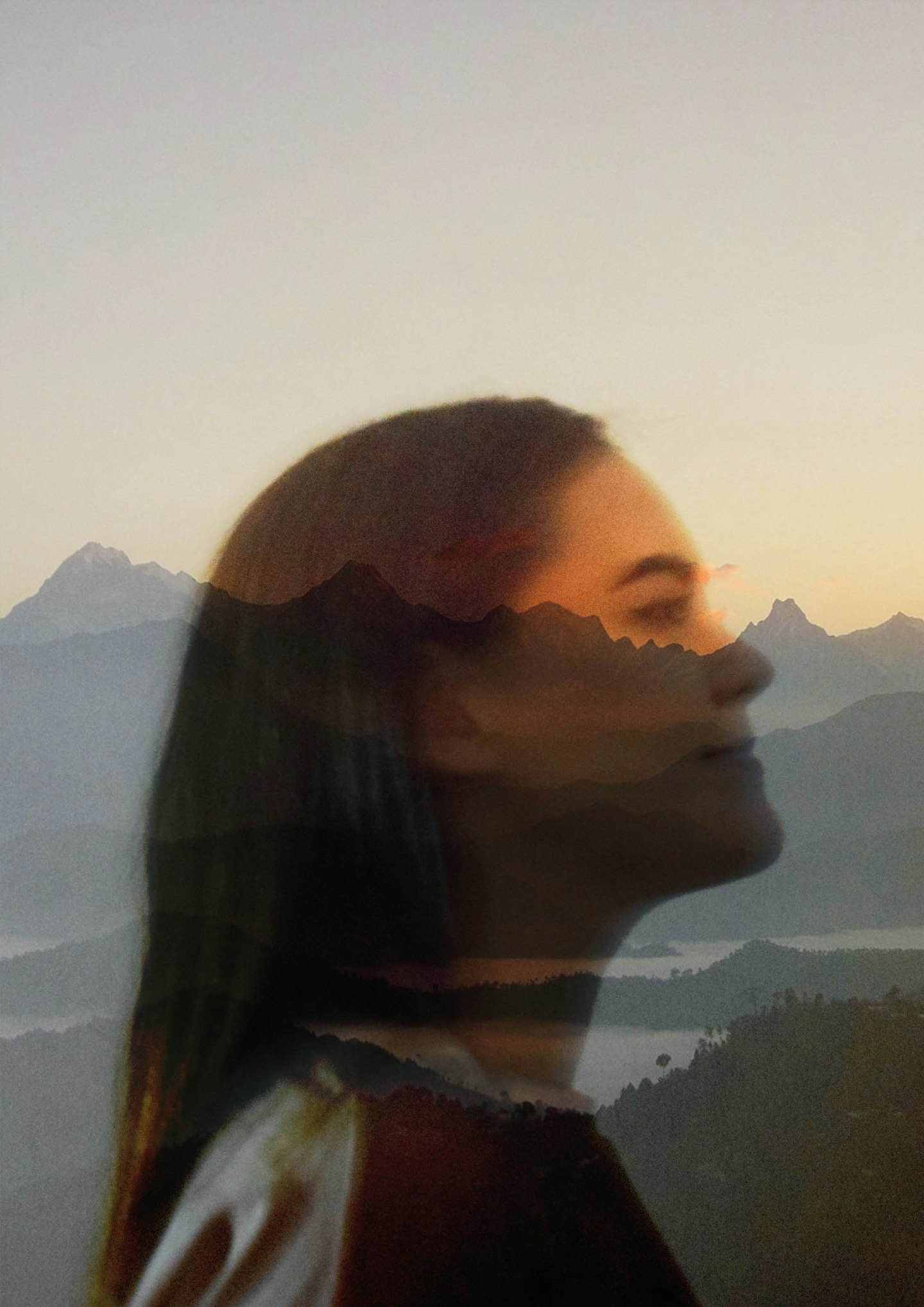 2 of 9
2 of 9Alex Copeland, BA Fashion Marketing at University of East London
**Can you please explain your final project?**Green is a bi-annual publication that focuses on sustainable living, an informative platform that provides ethical alternatives to everyday life. The aim of Green is to solve the stigma that to be sustainable you have to make major changes to your lifestyle – the reality being that there are so many small ways you can help sustain the planet.**What has been your biggest inspiration?**My biggest inspiration has been my internship at Aequem (sustainable fashion e-com platform). I've learnt so much in the short time I have been writing for their journal, which has been a significant help towards putting together my final project. Being a part of the change they're making and gaining a greater understanding of why it is so important has been a real motivator for me. **Which fashion designers/creatives would you cite as your biggest inspiration?**Creatively, I have found a lot of inspiration from designer Simon Porte Jacquemus. The archived photography posted on social media during lockdown really spoke to me. A creative, who still is managing to be creative with such little resources. Simple in style and execution, the photographs were a reflection of the visuals I wanted to create in Green.**What do you think fashion will look like in 10 years?**The landscape of the fashion industry is changing rapidly. In 10 years I think we can expect to see brands and designers taking action, not just talking about it. As we begin to see the structure of fashion week evolving to fit the current climate, I expect this will only amplify in years to come, alongside the rise of the conscious consumer.**What's been your highlight during your time studying?**Living in the heart of London's East End has got to be my highlight. Submerged in culture, my horizons have broadened which has given me an unparalleled university experience. And of course the people I've met along the way. They say the friends you make at university are friends for life and the people I've met are a real testament to that. **What's your ambition now you've graduated?**Writing has always been a hobby of mine, inside and outside of university. I hope to further this beyond gradation as a career path in industry. With my interest in sustainable fashion and lifestyle, I'd love to work for a publication or platform in support of that!
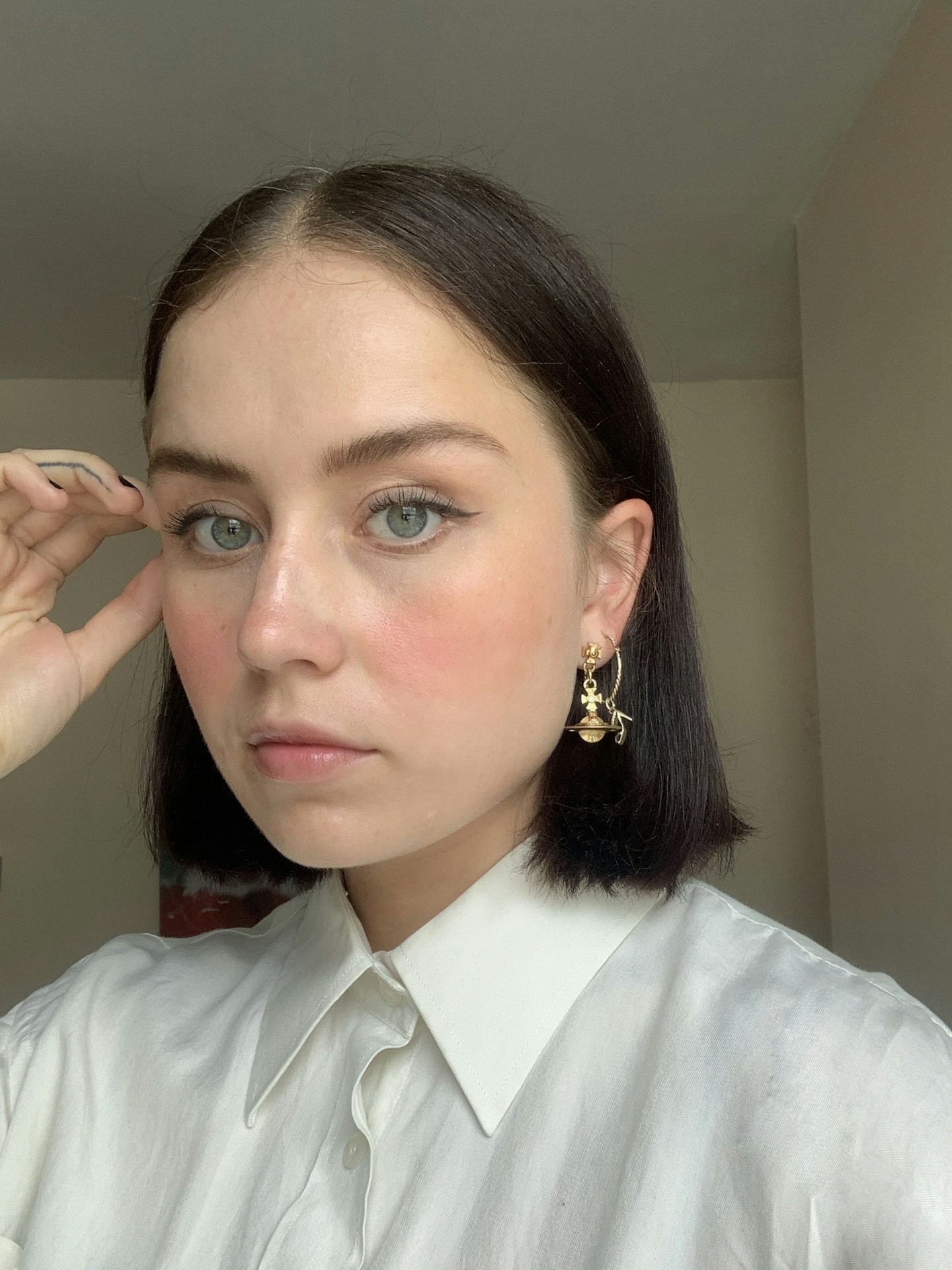 3 of 9
3 of 9Anna Vanova, BA (Hons) Fashion Promotion at University of South Wales
Can you please explain your final project?Cyklus is a unique, 3-in-one peer-to-peer app, that works hyper-locally. It connects local communities through clothing rental, repair and resale. All three elements of keeping garments more circular are available in one easy-to-use app focused on services and items based in your local area. Cyklus is about creating a community around being more conscious of what you buy, wear, contribute, consume and say. **What has been your biggest inspiration for the project?**My main inspiration for Cyklus were the millions of tons of clothing that end up in landfill each year and my passion to stop this from happening. Which fashion designers/creatives would you cite as your biggest inspiration? The biggest inspiration to me and the women I look up to are the sustainable fashion advocates Celine Semaan, Orsola de Castro and Dana Thomas. I am currently obsessed with the London-based brand Chopova Lowena who are recycling folkloric fabrics, deadstock materials and making beautiful garments by using traditional craft techniques. **What do you think fashion will look like in 10 years?**I have a strong belief that the majority of the fashion industry in 10 years will be using sustainable practices. Not only because of the impact on the planet but also the pressure brands will face from their customers. I also believe that the vast majority of fashion in 10 years will be virtual/semi-virtual with the increase in use of AR and 5G. **What's been your highlight during your time studying?**The highlight of my studies was having the freedom of writing my brief for my final project and being able to choose the subject I am so passionate about, which is sustainability, and to educate myself further on the issues within the industry. **What's your ambition now you've graduated?**Now that I've graduated, I am actively seeking creative job opportunities in the sustainable fashion sector and I'd love to pursue Cyklus further for it to be an app every fashion-conscious person uses. We have to change the community in order to change the world!
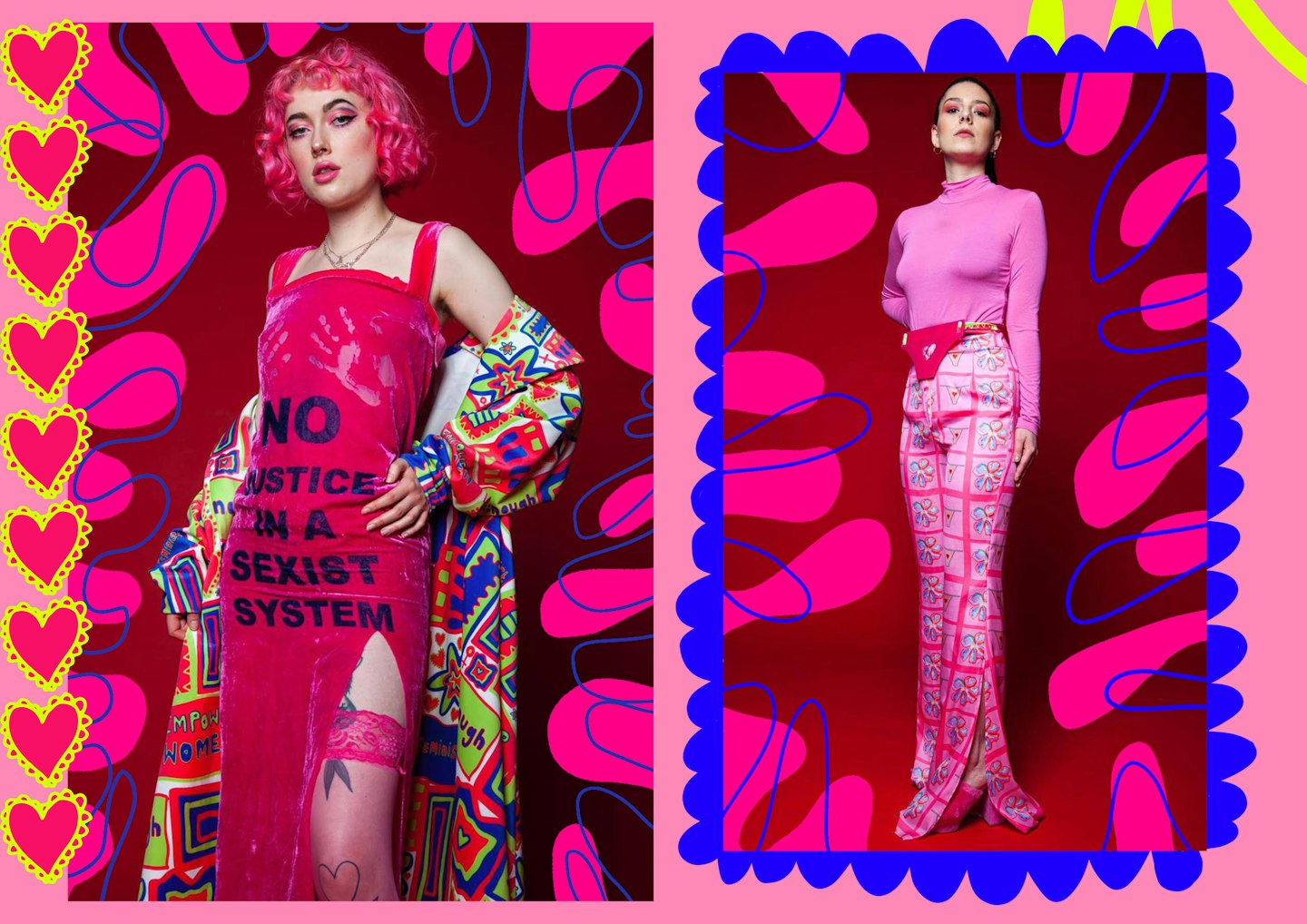 4 of 9
4 of 9Hally Ahmed, BA Fashion Textiles: Print, University for the Creative Arts, Rochester
**Can you please explain your final collection?**My graduate collection - ASKING FOR IT|for the woman who isn't, is all about power-dressing, empowerment and raising awareness of men's violence against women and amplifying the voices of women. My collection is political, bold, and colourful. **What has been your biggest inspiration?**I look at how the media victim-blame women for their sexual assault/rape, whilst gaining inspiration for my designs from attending feminist talks and protests. One of the feminist talks I've attended was at the London Metropolitan University called- Outliving Oneself: Surviving sexual violence: a conversation between Professor Susan Brison and Liz Kelly. The experiences of Susan Brison who was brutally raped, strangled and left for dead by a stranger when going for a walk one day has been an influence behind my work. This was in the 1990s, when Susan was 35 years old at the time. She then went public about another earlier experience which happened in her 20s and in the article she stated- "One was the best kind of rape, as far as my credibility as a victim was concerned. The other was the worst." Both stories of her experiences weren't about her or about the two men who raped her. They are about the numerous women who have been raped and why some of them speak out and most of them don't. Ultimately, if we fail to draw the connections between the forms of men's violence against women, women and girls will continue to be assaulted, victim-blamed and failed.**Which fashion designers/creatives would you cite as your biggest inspiration?**The list is endless but here goes - Mary Quant, the queen of sixties fashion, Joshua Kane, for all the gorgeous, dreamy bespoke suits, Rixo for all the snazzy printed dresses and Beulah London, a brand who exist to empower vulnerable women, amplify their voices and put an end to slavery. They also donate 10% of their profits to charity.**What do you think fashion will look like in 10 years?**My hope is that the pandemic will make people realise that over-consumption is not needed and that we can live without that new top. I hope it makes us become more sustainable and supportive of small businesses. In the words of Anna Lappe - "Every time you spend money, you're casting a vote for the kind of world you want.''**What's been your highlight during your time studying?**Personal growth is the biggest highlight for me, I'm a completely different person to who I was in my first year, I feel that I have flourished both academically and personally in my final year. There were times I didn't think I would make it to the finishing line, but I did and even with the impact of Covid-19 cutting my final year short, third year has truly been the biggest high and best year for me by far! As well as meeting the most incredible, fabulous friends who continue to uplift me and are my biggest supporters! Being around such a diverse, positive, creative class, where the idea of ''competition'' is non-existent but rather we all rooted and continue to root for each other is what makes UCA what it is. Shoutout to all the fab women working at UCA Rochester who listened, supported and believed in me through my journey.**What's your ambition now you've graduated?**My plan is to further my studies at my university studying an MA in Printed Textiles for Fashion & Interiors, however due to Covid-19 I may wait a year before doing so. I want to design and sell funky printed formalwear that can be dressed up or down, mainly consisting of power suits and ties for women as I believe there is a gap in the market and I feel my graduate work is a great starting point in developing this further.
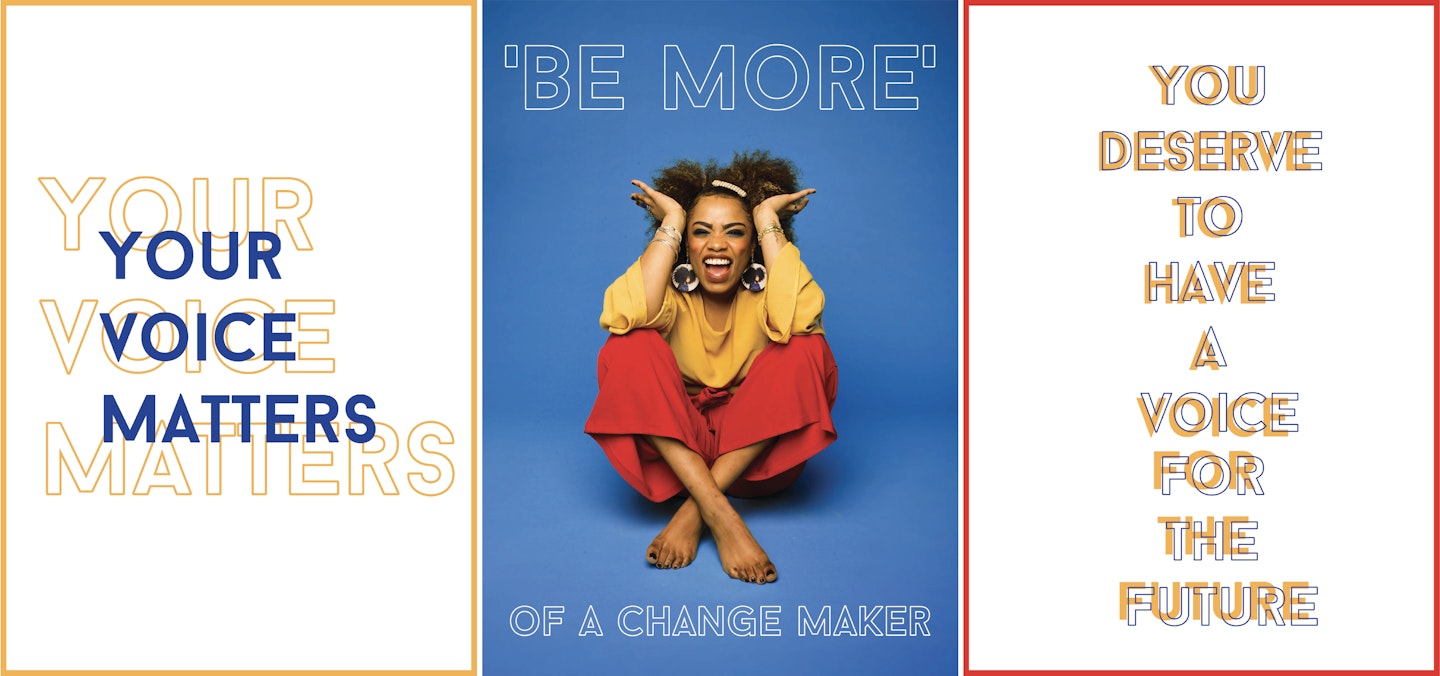 5 of 9
5 of 9Elizabeth O'Boyle, BA (Hons) Fashion Communication & Promotion,Norwich University of the Arts
**Can you please explain your final project?**For my final year project, I conceptualised an interactive marketing campaign for the British Fashion Council, that poses a call to action for all emerging fashion creatives. Fundamentally 'BE MORE' is a platform for conversation and education on all things sustainable. Its main purpose is to educate emerging creatives on how to build sustainable mindsets into their growing business/careers, so it becomes the norm not a trend. In order to achieve this outcome, the main tactic of 'BE MORE' is to use the voice of emerging creatives to inform the direction of the conversations around sustainability in fashion and build a collaborative solution for change.**What has been your biggest inspiration?**Through my three years of study, sustainability and ethics have become central to my work and I really wanted to find a way that incorporated everything I have learnt and am passionate about into one project. The inspiration for 'BE MORE' really grew out of my own desire to create sustainable change in the fashion industry. I was overwhelmed by the oversaturated conversation about sustainability and the amount of information there is. 'BE MORE' developed out of a desire for more collaborative conversations that included the next generation moving into the fashion industry. It allowed me to create a way that change could happen authentically and organically for each individual and create a collaborative solution to help change the fashion industry positively.**Which fashion designers/creatives would you cite as your biggest inspiration?**In terms of my project, Patagonia was a massive inspiration. It was from researching their brand values and business model that really pushed 'BE MORE' forward in terms of the topics to be discussed and the values that 'BE MORE' would hold. For me Patagonia is a great example of a brand that has embedded sustainable and ethical values from the start into the core of its business in the most authentic way.**What do you think fashion will look like in 10 years?**That's a big question! I would hope that fashion will be a more sustainably and ethically driven industry, with more of a focus on the art of making clothes not money. I think it will be important for brands to continue providing transparent supply chains, and consumers demanding this. It will take time for complete systematic change as it will uproot the current fashion system, but I think will be important in creating a new more sustainably minded industry. In the meantime, however, brands need to be honest and open about their desires and efforts to become more sustainable, so they maintain the trust with their customers. Overall, I am optimistic that the fashion industry can become more sustainable and ethical industry.**What's been your highlight during your time studying?**Within our course we have always been encouraged to follow our own path and undertake projects and brands that we are personally interested in. This has been invaluable as it has allowed me to find my voice and discover the areas of fashion that I am most interested in. Having this freedom to find my voice has really helped me develop my creative practice in a more authentic way. Having this freedom has meant that everyone in my class has a different aesthetic, voice or message which is amazing to see and listen to, providing us with a well-rounded view of the fashion industry and network of peers who can help each other. This has helped when working collaboratively with others, giving me the chance to feel like part of the industry and simulate an environment where lots of creatives can contribute their ideas and work together.**What's your ambition now you've graduated?**In the short term, I would like to continue learning and developing my knowledge of marketing and campaign creation within the setting of creative agencies, and be able to apply what I have learnt at university into real-life scenarios. I am keen to gain as much industry awareness as possible through internships and work.In the long term, I have the desire to set up my own creative agency with a social and sustainable commentary that will tackle the issues of change in the fashion industry. This is the dream!
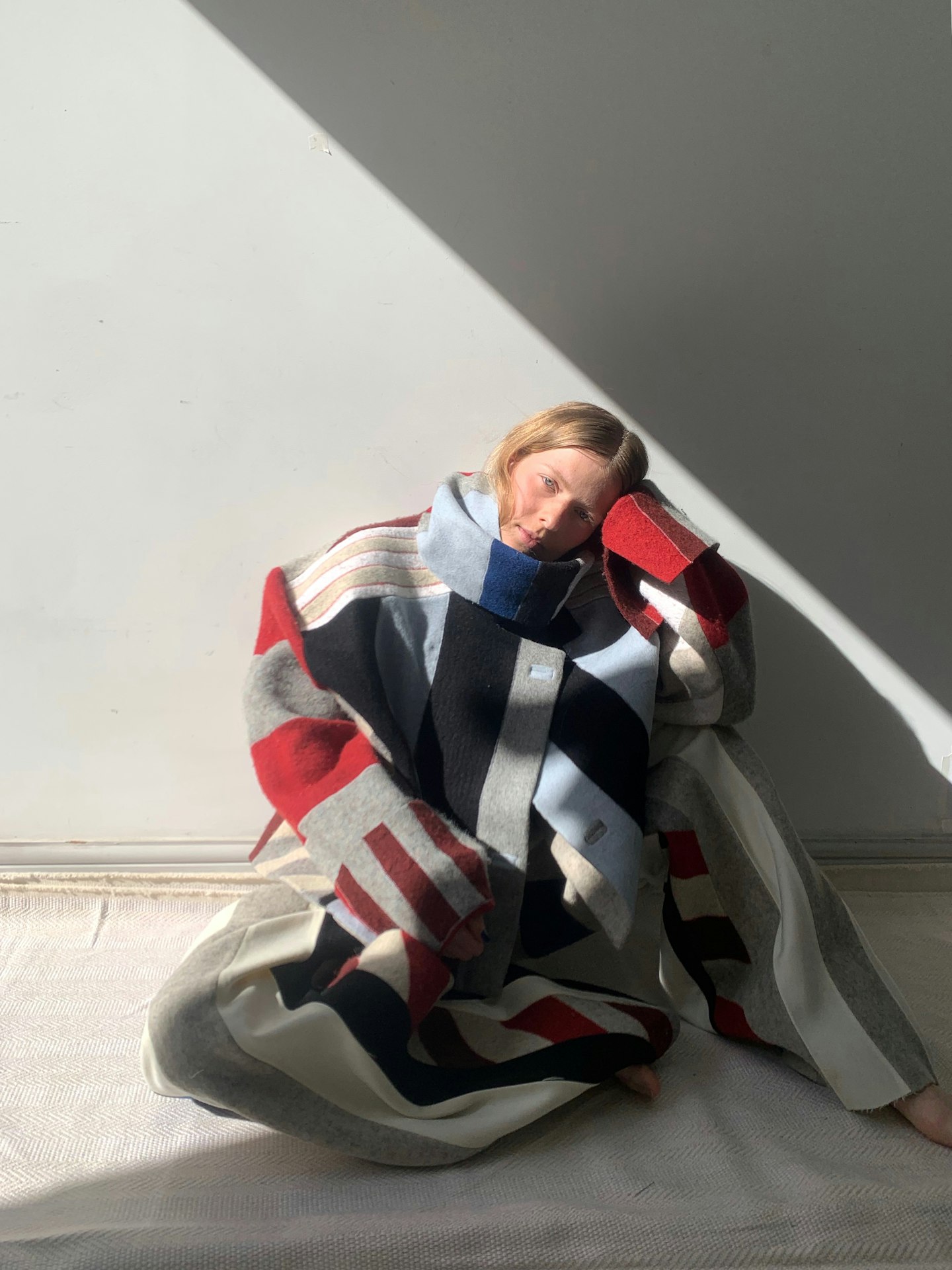 6 of 9
6 of 9Hermione Read, BA Fashion Design at the University of Edinburgh
**Can you please explain your final collection?**Show Your Stripes, my graduate collection, was initiated by my research into the history of my area of London and interviews I took with locals there. I was saddened by the loss of soul and community caused by false regeneration schemes and gentrification and want to shine light on these issues by responding to these human stories through sustainable mediums. My concept follows the idea of patching pieces of history and community back together, re-injecting fashion with a sense of soul and identity. I aim to promote longevity in fashion, as well as being bold and rebellious in how we express ourselves, showing our true stripes. In light of this I collected, felted ,then deconstructed hundreds of second-hand woollen jumpers which I patch-worked to be reborn as my anti-fast fashion garments for 2020's modern ethical and sustainable warrior.**What has been your biggest inspiration?**Not only trying to address how I can be a more conscious designer, but my love of being a Londoner and the eclecticism of different identities and communities that is so incredibly important here. The stripe came into my research as I discovered it has such a complex history, being a pattern used in history to highlight an "outcast" from society, or a criminal, which I re-imagine as something celebratory, timeless and bold. I think being honest and true to myself has been a big part of it too, to create something that is meaningful and makes a statement, much deeper than on an aesthetic level.**Which fashion designers/creatives would you cite as your biggest inspiration?**Emily Bode's use of vintage fabrics, and contemporary take on historic textiles and traditional menswear has been a huge inspiration to me, as re-mixing the past is something so fundamental in fashion. Instead of fast-fashion and the "throwaway" culture that has overwhelmed the industry, looking at how we can make things last more than that season is essential to a more sustainable future. I also admire Nicholas Daley, who puts a strong focus on craftsmanship, looking to his heritage and questioning his identity through his work.**What do you think fashion will look like in 10 years?**I strongly hope it has moved on in a more sustainable direction. I think we are at a pinnacle of concern with the climate crisis, and fashion must slow down. I hope the leading people rewrite the rules, reducing the number of seasons released, being more ethically and sustainably responsible. I also want to see voices heard in fashion who are currently under-represented, creating a platform where all creatives can thrive. I hope fashion reaches a point where it doesn't create a facade, but is instead transparent and could pioneer real change.**What's been your highlight during your time studying?**There have been so many. I think an overall highlight for me has been being in such a small year group of such talented and kind people, it has felt like such a nurturing space in which to be yourself. The studio environment is also a lot of fun, so the hilarious late evenings in the studio with friends chatting (often weeping) over finishing garments whilst devouring a pot noodle has definitely been a bonding experience! Oh, and any excuse for a themed party of course, from The Revelation to Kingdom of Atlantis, Edinburgh does them well.**What's your ambition now you've graduated?**I would love to work for a sustainably, forward-thinking design company in either garment design, or a material aspect such as print, to express my love of colour and fabric innovation. Further down the line I'd love to start my own brand, having done some travel and more research relating to human stories, and how fashion can be utilised as both a platform to make change, and an art form. "Creatively I owe a lot to my mother and father who devote themselves to their passions, and inspire me everyday."
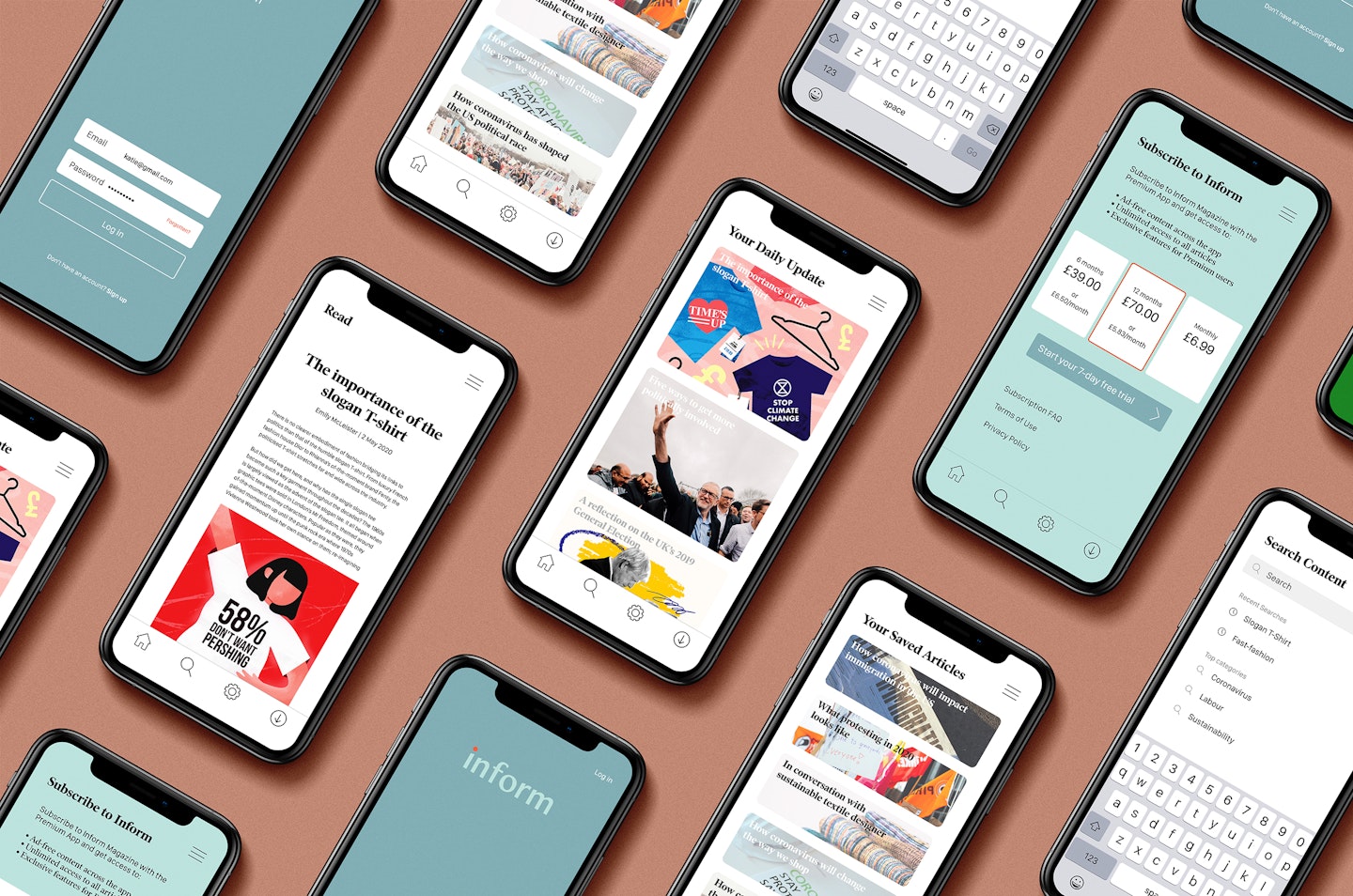 7 of 9
7 of 9Emily McLeister, BA (Hons) Fashion Communication & Promotion, Norwich University of the Arts
**Can you please explain your final project?**My final project is the proposal of a new, online platform called 'Inform' designed to provide a better link between fashion and politics. The platform provides the UK's fashion community with engaging and digestible content surrounding politics, so that education can be built upon and conversation can be encouraged surrounding important topics. I created various digital outcomes, as well as designing a publication focused on showcasing my keen interest in fashion writing. **What has been your biggest inspiration?**Whilst I was trying to better educate myself on political matters back in December in the run up to the UK's General Election, I became aware that there really weren't any engaging political platforms that were targeting the young fashion demographic. I realised that many others in the fashion industry shared the same frustrations, and so identifying this gap in the market this was my ultimate inspiration to begin Inform as my final project.**Which fashion designers/creatives would you cite as your biggest inspiration?**There are so many! To name just a few, I am hugely inspired by the work of Rejina Pyo, Imran Amed and Leandra Medine. I look up to creatives who have instigated positive progression within the fashion industry and continue to push boundaries to promote change through their fresh approach.**What do you think fashion will look like in 10 years?**In 10 years time I think the fashion industry will have made some significant changes in becoming a more transparent and inclusive industry. We are certainly already seeing a shift towards a more updated model; such as Gucci announcing it is going seasonless. Consumers in 2020 are savvy and are demanding transparency, and I think brands need to adapt to this demand in order to remain relevant. I hope that soon it will be the norm for brands to embody authentic transparency and inclusivity - not just as a marketing tactic but actively living this out.**What's been your highlight during your time studying?**Definitely being able to meet so many people! Not only my peers, but also being able to connect with such a wide variety of industry professionals. NUA offer incredible links to industry and this has really helped me to gain a realistic understanding of the fashion industry. Chatting with so many inspirational people and gaining insight from them and their practice has refined my work to become really relevant to the industry today.**What's your ambition now you've graduated?**The future is certainly somewhat unknown for the class of 2020 - I mean, we definitely didn't anticipate being in lockdown as we graduated! But despite this I am driven to kick-start my career in fashion, and my long-term ambition is to pursue a career in brand strategy and writing where I can use my skill-set to contribute towards positive change. But for now, whilst I'm at home my plan is to realise Inform into a live digital platform, where I can encourage the important political and cultural conversation within the global fashion industry.The illustrations that feature within Emily's work are by Erin Ruane
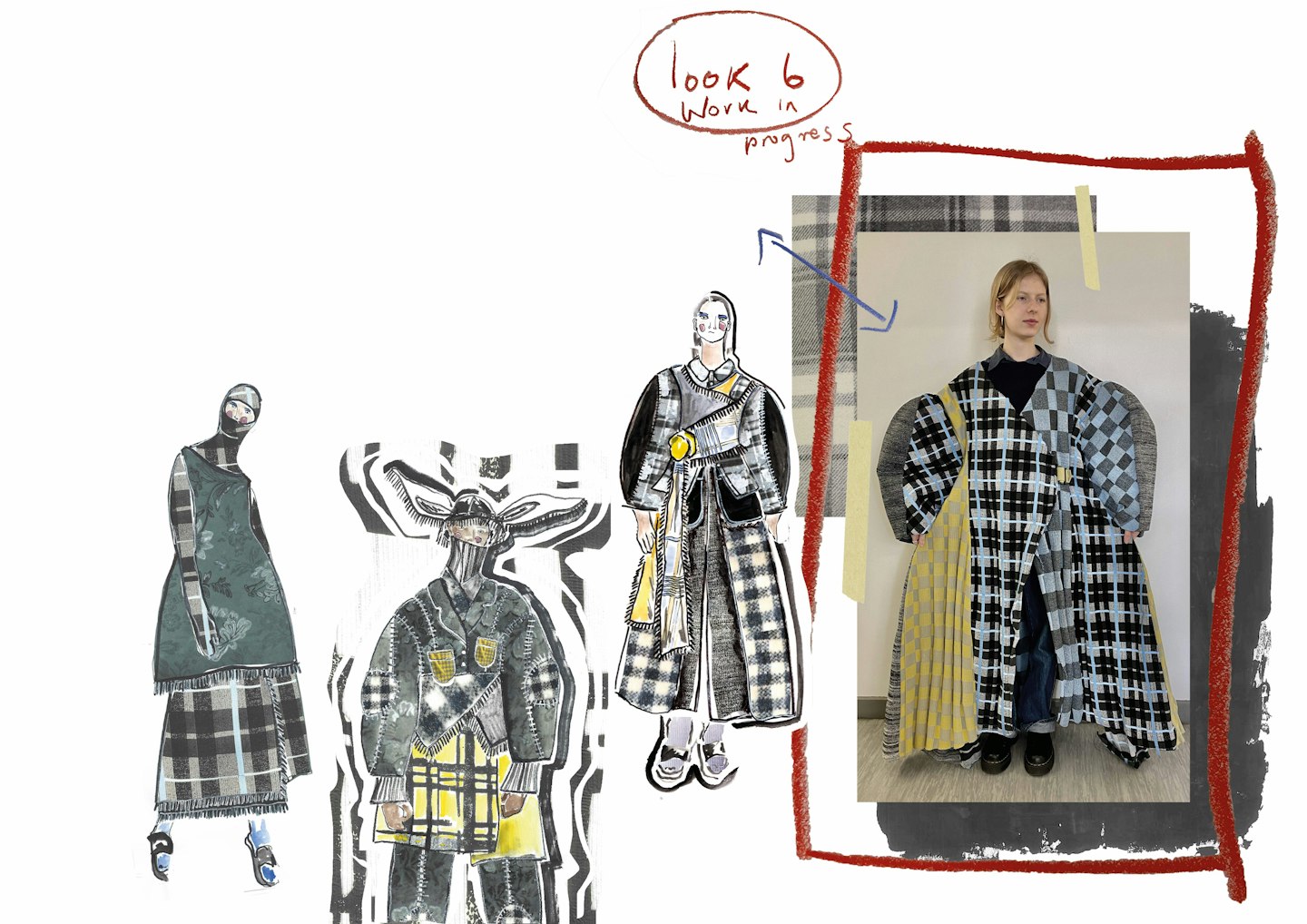 8 of 9
8 of 9Lucy Walker-Cox, Fashion at Edinburgh College of Art
**Can you please explain your final collection?**My collection takes inspiration from women of the past/present who have thrived against the odds, and gives them an imagined future where they are safe, empowered, celebrated. Looking at my own Scottish heritage and the women in my family, I was inspired by the combination of technology and traditional craft that is used in so many of the industries in the highlands - from whisky to shortbread. I wanted to bring this idea of innovating with craft to the forefront of the collection, particularly through my knitting. I want my collection to celebrate and empower women and to be as inclusive as possible. **What has been your biggest inspiration?**The biggest inspiration for my collection was my heritage and the local industries and crafts found in the North of Scotland where I am from. I wanted to pay homage to that whilst experimenting with different, new materials. I wanted my collection to feel safe and protective to those who wear it, and I created it for the strong, resilient and inspiring women in my family who made me who I am. Which fashion designers/creatives would you cite as your biggest inspiration? Growing up, Meadham Kirchhoff and Ashish were the first designers I was really drawn to, and they're what made me want to study fashion. At the moment, Richard Malone is a huge inspiration to me because of his transparency and commitment to sustainability. He doesn't just talk about it, he acts on it. His made-to-order business model is exciting as it means he has a personal relationship with his customers. He's created a brand which feels friendly and welcoming, and that's something that's important to me. **What do you think fashion will look like in 10 years?**I think there will be a big return to traditional methods and crafts, and a more DIY attitude towards fashion. People will be more conscious about what they're buying and who made it. All businesses will have to be totally transparent about their supply chain, factories, and production methods, and this will allow socially and environmentally conscious design to be more accessible. At the same time, there will be huge advances in smart fabrics, AI, and new materials. These innovations will be combined with a new, more thoughtful way of making and consuming fashion. This will lead to a far more inclusive and exciting industry.**What's been your highlight during your time studying?**My highlight was being able to work in the studio everyday with my friends - the atmosphere was positive and no matter how stressful it got we were always able to laugh about it and help each other out. I loved looking around everyone's spaces at their mood boards and inspiration, and getting their feedback on my work helped me to develop it a lot further. **What's your ambition now you've graduated?**I want to work within a fashion house and learn as much as I can from established designers, with the aim of eventually starting my own label.
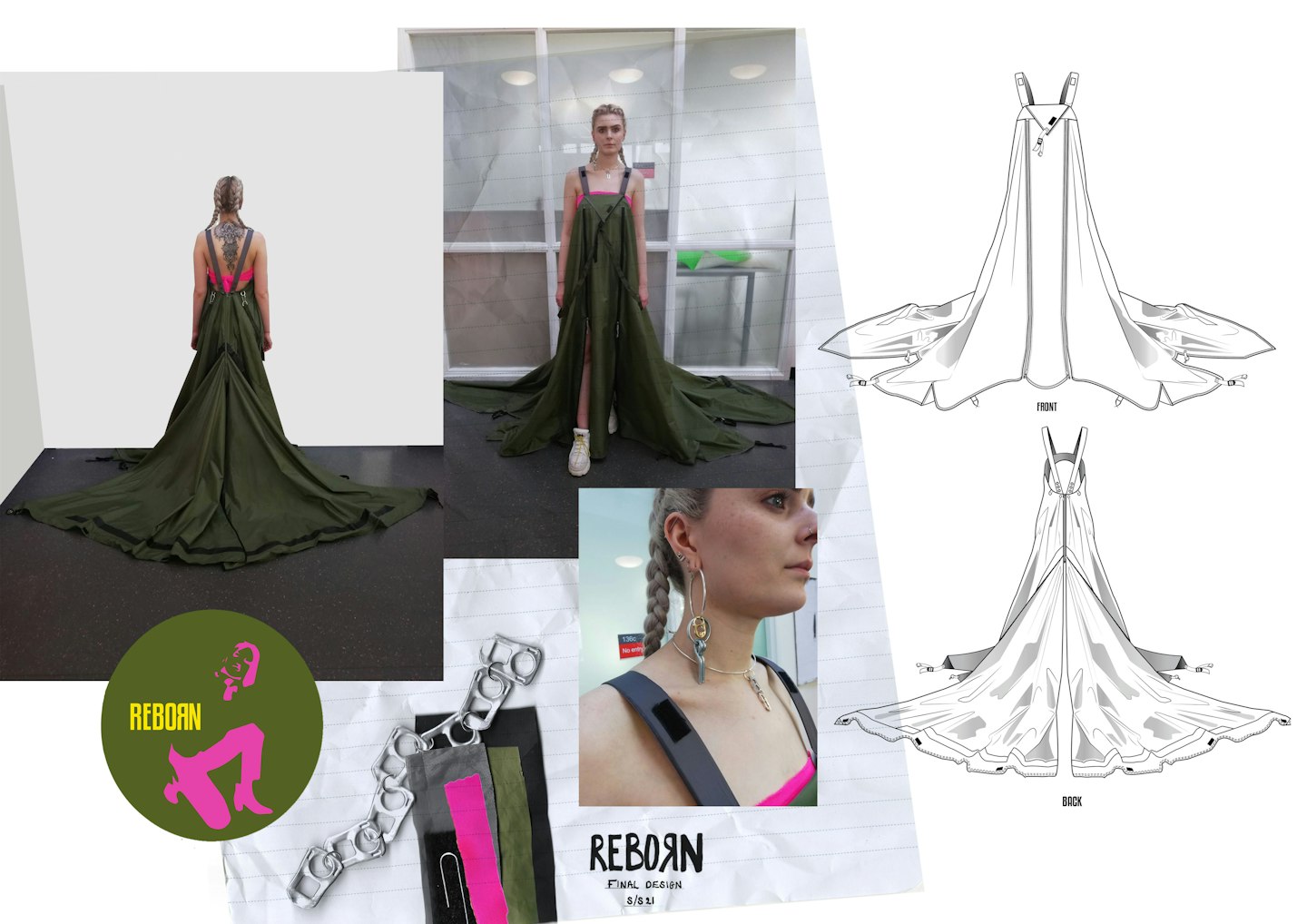 9 of 9
9 of 9Tasarla Lagan, BA Fashion Design at Leeds Arts University
**Can you please explain your final collection?**A responsible collection that recycles festival waste, capturing lost memories of euphoria by reworking tents into garments to give them a new lease of life. It depicts social issues around femininity, by throwing away the traditional rule book and creating an informal feminine stereotype. **What has been your biggest inspiration?**Without a doubt, sustainability has been the centre point of inspiration for my collection. Using modern and unconventional ways of fashion practice REBORN presents unique, one off and bespoke items. Alongside that, feminine identity and festival culture has also had great influence on my collection, I was initially inspired by the study of various opposing feminine stereotypes and how society has had a significant impact on their social conformities. In relation to the festival culture I decided to pick one stereotype that related best to the image of a stereotypical female festival goer; that of a Ladette. Festivals are an integral part to my summers, but almost everyone I have attended the majority of people forget to be responsible while having fun; leaving lots of materials behind for organisers to deal with. Therefore I have decided to combine all these points of inspiration to produce a cocktail of components to create my collection that I have named REBORN. **Which fashion designers/creatives would you cite as your biggest inspiration?**As a whole I am influenced by designers who are currently making conscious changes to improve the fashion industry. Ahluwalia studio is one of my biggest influencers, her dedication to sustainability and fresh thinking forward approach to design is inspirational. Very similar to my own collection she uses dead stock materials to rework into new garments by giving them a new lease of life. The Raeburn Lab is another of my biggest inspirations, the complete transparency in their studio is refreshing to see and some what futuristic. Its energising to recognise brands like Raeburn inviting consumers in to educate them about the complete process - a procedure that most companies conceal.**What do you think fashion will look like in 10 years?**I think we will see a lot of entrepreneurial business succeed – due to the planet's alarming state, designers need to be making conscious and chancy efforts to be much more sustainable, creating unusual but soon-to-be familiar ways of design, production and consumerism. Current platforms such as garment swapping agencies will be more popular when the majority of consumers begin to acknowledge how harmful fast fashion has become on the planet. I think fast fashion will slowly die out, clothing will become more expensive, even in the high street. When the clothing economy is forced to change the people will be forced to follow. **What's been your highlight during your time studying?**Overall my biggest highlight during my time studying has to be back when I got selected to attend the first exclusive event at the McQueen studio for my hard work and recognition during my second year tailoring project. This experience was so inspiring and motivating, it made me find the confidence I never had. I took away so much valuable advice from the event, it taught me to go with my inner creative self and flourish with who I am as a designer.Leeds Arts University has taught me so many invaluable skills about the fashion industry, another highlight I would consider during my time studying is gaining the quality of time management. During my education I have learned how to be prompt, sufficient and organised, not only is it an essential attribute to the fashion industry but an extremely useful life skill I will use for the rest of my life.**What's your ambition now you've graduated?**My ultimate dream has always been to travel the world, therefore finding placements abroad or learning about cultural textile or apparel production would be my goal. Making a difference in these types of communities is also an ambition of mine, just before Covid-19, I volunteered at the main Oxfam recycling centre. Finally, of course, I would also love to work for one of my favourite designers doing an apprenticeship or a junior designer role, designing and creating responsibly to make the world a healthier and happier place.
